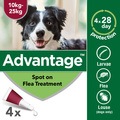You may have heard in the news over the last few months that Tick-Borne Encephalitis has been found in ticks in certain areas of the UK. Here at VioVet we have put together a guide on what this means for you and your pet.
What?
Tick-borne Encephalitis (TBE) is caused by a virus that is transmitted through tick bites. It mainly affects humans, and knowledge of it’s impact on animals is limited, but dogs can be infected too. Many infected animals won’t show any signs at all, but rarely it can cause fever-like symptoms (high temperature, lethargy, weight loss, inappetance) and neurological signs (wobbly, weak, lack of sensation).
Where?
It is regularly found on mainland Europe and Asia. It was announced on 29th October 2019 that TBE has been found for the first time in a very small number of ticks in 2 locations in England (Thetford Forest and the Hampshire/Dorset border area).
The early findings are part of ongoing research by Public Health England (PHE) and the Emerging and Zoonotic Infections National Institute for Health Research (NIHR) Health Protection Research Unit at the University of Liverpool.
What to do?
Don’t panic!
The public risk is currently classed as very low. Only one human has been diagnosed with probably having the disease so far.
Best advice is to:
1) Seek your local vet’s advice in regards to local risk and what they recommend for your pet.
2) If you are near an affected area, or concerned, then consider tick preventatives and removers.
Below is a useful guide on what to use: 
Tick preventatives/treatments
All animals
When you see a tick, it is best to remove it. The likelihood of tick-borne encephalitis is unlikely, but they can cause skin infections or irritation. The best way to do this is with a tick remover. Do NOT attempt to pull a tick off manually with forceps or your hands, as often this leaves the head inside your pet, which can cause infection. Below are a few tick removers we would advise and all come with instructions on how to use them:
O’Tom Tick Remover
Horses/Farm animals
Ivermectin-based wormers will kill ticks, but excessive use of these is not advised as it predisposes to wormer resistance. Barrier preventatives are more practical and convenient:
Dogs/Cats
Spot-on, tablet and collar preventatives are easy to use and apply. Prescription products are available but seek your vet’s advice regarding these. However there are effective non-prescription products available to order straight away, and below are some we stock:
Frontline Plus Spot On (dogs/cats)
Thanks for reading this latest update. I would advise overall not to worry; these are isolated incidents so far and more research is required to determine to what extent TBE is present in the UK. Even if infected, your pet may not show any signs of disease at all and remain healthy.
Tick preventatives and treatment are easily included in your pet’s flea/worming schedule at very little extra effort. It is best to discuss this with your local vet, but if you have any questions regarding our products that they cannot answer then please email or phone our customer services. We would love to help you keep your pet happy and healthy.
Written by: Vet (Guest Author)








